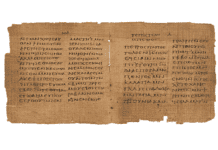I think the Southern Baptist Convention, as we sail into a season where our culture is more and more hostile toward people of faith like ours, I think we ought to be reaching out to other groups of Baptists who have the same kind of theology that we do, but we’ve been separated by trivial things maybe, down through the years, to try to grow our family in that way. One of the things I would like to do if elected president of the SBC is show up at some of their annual meetings, go to the annual meeting of the Baptist Missionary Association of America and say, “We just want you to know that we’re Baptist too. We believe the Bible, too, and you can be in your group. That’s fine, but we love you, and we’re going to need each other before this is all over.”
So, for me, racial reconciliation is reconciliation, which is something that we need to be doing on a lot of fronts to try to grow and strengthen our family of churches.
You pastor a church of normative size in the SBC. Not a megachurch. Does that work as an advantage for you?
Yes, but I think there’s some benefit to it because—I don’t want to be uncharitable in the way I say this—I think there’s some benefit to it because I think if you pastor a large church, it’s easy to get into a situation in which without many obstacles you’re able to implement whatever it is that you think is the right thing to do. When you’re at a church the size of my church you know that you have to persuade people and bring them on board in order to accomplish and move forward with anything, more coalition-building. We’re a congregationally governed church.
To be president of the SBC in a church, like [mine], and it’s not just about size, it’s about being really committed to Baptist polity. I mean you have small Presbyterian churches too, right? They don’t have the same approach. But in a small Southern Baptist church, committed to Baptist polity, if the messengers of the SBC, if I’m elected president and then we’re trying to do something and they say no to what I want to do, it’s not going to be my first time. It happens in my church that I think we ought do something and the church says no. And so I know what that feels like. I’m not going to throw a temper tantrum, stomp off and be mad or something like that.
I’m just going to say, “Gosh, either they were right and I was wrong, or I need to do a better job of making my case next time, one or the other.” So I think there are some advantages in that the annual meeting functions, more like a smaller church business meeting than like the way that decisions are made at really large churches in the SBC. But the obvious disadvantage, I think, is I don’t have a big staff that makes it easy for me to just stroll away from FBC Farmersville and let other people handle some things for me.
We’re going to have a large business meeting in New Orleans next June, but we’re going to have a business meeting at FBC Farmersville every month between now and then except December. I’m going have to prep for it, and I’m going to need to be there for it, for those sorts of things.
So, I think those disadvantages just of scale and the amount of help that you have, they’re not insurmountable. SBC presidents of late do a lot of things that you do not have to do. You don’t have to go preach all over the country to be president of the SBC.
What are some of the most important assignments of the SBC president?
The president of the SBC has, I think, in some ways, the same cluster of responsibilities that the Executive Committee of the Southern Baptist Convention has. I would think all of it can be fit under three headings: to protect the rights of the messengers, to answer the messengers’ questions, and to execute the messengers’ instructions.
I think that the president of the SBC protects the rights of the messengers by conducting the annual meeting in such a way that our rules of order are followed and that people have a fair shot to come to the microphone to make their case. Have a fair shot, most importantly, of hearing everything that they need to know, to make a prayerful and informed decision and to cast their ballots and for all that to be counted fairly. And for all of that to be handled in a way that the messengers’ rights are defended.
There’s also a need to answer the messengers’ question, that the Executive Committee does more of that than the president does because there are referrals to the Executive Committee, but the president is a member of the Executive Committee. And so he plays a role in that process for the Executive Committee. Being the member of the EC as he is, because he is president of the SBC, I think he has a special added responsibility to be an advocate for the intent of messengers’ questions, for making sure that they get good answers to the things that they’re asking about and good recommendations from the SBC, that are made with their interests in mind. I would want to be an advocate for that.











